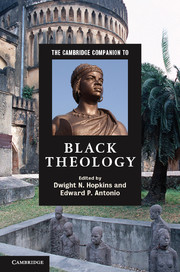Book contents
- Frontmatter
- Part I Introduction
- 1 General introduction
- 2 Historical perspective
- 3 Black theology and liberation theologies
- 4 The social sciences and rituals of resilience in African and African American communities
- 5 Black theology and womanist theology
- Part II Themes in black theology
- Part III Global expressions of black theology
- Further reading
- Index
- Other titles in the series
3 - Black theology and liberation theologies
from Part I - Introduction
Published online by Cambridge University Press: 28 September 2012
- Frontmatter
- Part I Introduction
- 1 General introduction
- 2 Historical perspective
- 3 Black theology and liberation theologies
- 4 The social sciences and rituals of resilience in African and African American communities
- 5 Black theology and womanist theology
- Part II Themes in black theology
- Part III Global expressions of black theology
- Further reading
- Index
- Other titles in the series
Summary
Black theology like other liberation theologies claims to be committed to fighting social injustice of every kind, everywhere: homelessness, unemployment, racism, sexism, homophobia, lack of access to healthcare and education, the marginalization of indigenous peoples, declining mortality rates, economic and other social impediments to ownership of property, hunger, economic inequality within and between nations, particularly between nations of the North and those of the South, human rights violations, discrimination of religious minorities, malnutrition and undernutrition, as well as environmental degradation and its impact on the poor. Granted that the list of injustices is not exhaustive we might say, then, that black theology is “related” to liberation theology, or is indeed a theology of liberation by virtue of its commitment to resist and eradicate all the injustices in the list. There are three significant features of this list to which I want to call attention. First, it is important to notice that it is comprehensive enough to include social, political, economic, environmental, cultural, and religious injustices. Second, at least on the face of it, it delineates a pluralistic understanding of modes of oppression. Third, the modes of oppression divide up into two categories: what has been called “struggles for recognition” centered on issues of race, identity, gender, sexuality and other forms of cultural injustice, and “economic oppression” centered on so-called “material inequality.” Dividing up oppression in this way is not new. It has been around for a long time in social theory.
- Type
- Chapter
- Information
- The Cambridge Companion to Black Theology , pp. 33 - 43Publisher: Cambridge University PressPrint publication year: 2012
- 1
- Cited by



